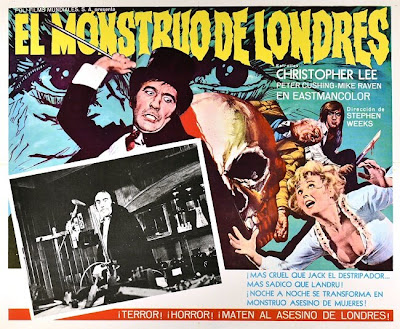
Director:
Stephen Weeks
Year: 1971
Rating: 5.5
Year: 1971
Rating: 5.5
I'm puttin'
on my top hat
Tyin' up my white tie
Brushin' off my tails
I'm dudin' up my shirt front
Puttin' in the shirt studs
Polishin' my nails
I'm steppin' out, my dear
To breathe an atmosphere
That simply reeks with class
This is what I thought the character based on Hyde should have been singing on his way out the door for an evening of frivolity and madness. This Amicus production is an adaptation of the Robert Louis Stevenson novella "The Strange Case of Dr. Jekyll and Mr. Hyde" and they bring together once again our two favorite horror stars of the period Christopher Lee and Peter Cushing. Cushing retains the same name as in the novella Utterson but Lee as Jekyll and Hyde has had his named changed to protect the innocent to Marlowe and Blake. What is intriguing about this version is that it sticks to the original story closer than any other film version and yet at the same time by focusing on Marlowe rather than Utterson takes away the mystery, the suspense that the book had when published.
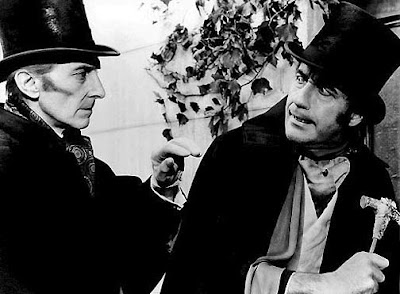
In the novella Utterson is the main character. When he sees his friend Jekyll acting oddly he begins to investigate and comes across Jekyll's friend Hyde who is an uncouth ruffian. A mutual friend saw Hyde run into a little girl, knock her down and then beat her on the street. He pays off the family with a check from the account of Dr. Jekyll. Utterson concludes that Hyde is blackmailing Jekyll and tries to find out why. Hyde kills a person with his cane - a man - not a woman as in the film - that Utterson can identify. Jekyll tries to give up the drug that transforms him but then finds that he is becoming Hyde even without it.
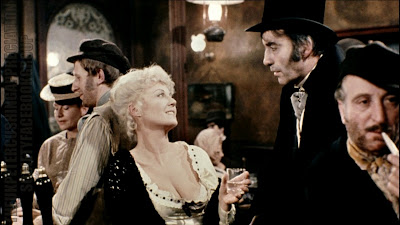
The film has generally the same plot but told from Marlowe's perspective and then switching to that of Utterson's half way through. But of course by then there is no mystery - no shocking revelation at the end when Utterson discovers they are the same man. Whether telling the tale strictly from Utterson's point of view would have made this more interesting is hard to say but the film never generates much excitement till nearing the end when it has some wonderful moments.
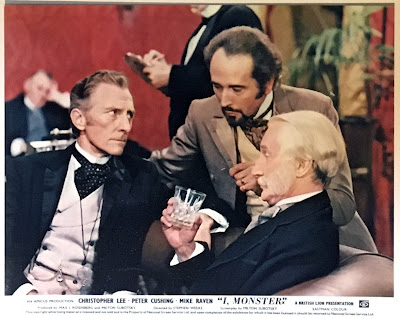
What it does have is a fabulous performance from Lee and a solid less flashy one from Cushing. Initially, Marlowe is a psychiatrist and as a cure for some of his patients injects them with this drug. He tells his friends at the Club that as a practitioner of Freud he wants to separate the Super Ego from the Ego from the Id and set people free of their inhibitions and fears that their conscious mind is hiding from them. When it turns a sexually repressed woman into one who tries to seduce him, he knows it is time to try it on himself. He slowly becomes a monster - in today's terms a psychotic who has no moral boundaries. Lee does a great job doing this - not the extreme make-up as others have done - but a wide creepy almost Joker like smile that scares the pants off you - dark puffery around the eyes, more teeth than a shark and five o'clock Nixon shadow. He contorts his body and walks differently. He is terrific.
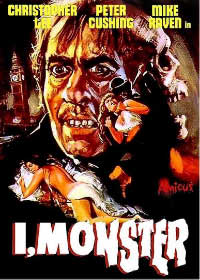
He portrays a man in search of science and advancements and only finds terror. As Marlowe he understands what he has done as Blake and feels guilt but can't stop - the transformation is a cocaine high. By taking half a loaf from the book and half a loaf from other versions, it ends up being half baked. Apparently, 20 minutes was cut taking it down to 80 minutes. Whether that helped or hurt the film I can't say but even at 80 minutes it felt a little long. We want Hyde to do monstrous things, the human mind untethered from right and wrong. This film is timid in going too far. It needed an injection of that drug.
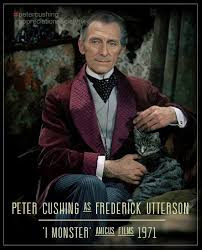
Tyin' up my white tie
Brushin' off my tails
I'm dudin' up my shirt front
Puttin' in the shirt studs
Polishin' my nails
I'm steppin' out, my dear
To breathe an atmosphere
That simply reeks with class
This is what I thought the character based on Hyde should have been singing on his way out the door for an evening of frivolity and madness. This Amicus production is an adaptation of the Robert Louis Stevenson novella "The Strange Case of Dr. Jekyll and Mr. Hyde" and they bring together once again our two favorite horror stars of the period Christopher Lee and Peter Cushing. Cushing retains the same name as in the novella Utterson but Lee as Jekyll and Hyde has had his named changed to protect the innocent to Marlowe and Blake. What is intriguing about this version is that it sticks to the original story closer than any other film version and yet at the same time by focusing on Marlowe rather than Utterson takes away the mystery, the suspense that the book had when published.

In the novella Utterson is the main character. When he sees his friend Jekyll acting oddly he begins to investigate and comes across Jekyll's friend Hyde who is an uncouth ruffian. A mutual friend saw Hyde run into a little girl, knock her down and then beat her on the street. He pays off the family with a check from the account of Dr. Jekyll. Utterson concludes that Hyde is blackmailing Jekyll and tries to find out why. Hyde kills a person with his cane - a man - not a woman as in the film - that Utterson can identify. Jekyll tries to give up the drug that transforms him but then finds that he is becoming Hyde even without it.

The film has generally the same plot but told from Marlowe's perspective and then switching to that of Utterson's half way through. But of course by then there is no mystery - no shocking revelation at the end when Utterson discovers they are the same man. Whether telling the tale strictly from Utterson's point of view would have made this more interesting is hard to say but the film never generates much excitement till nearing the end when it has some wonderful moments.

What it does have is a fabulous performance from Lee and a solid less flashy one from Cushing. Initially, Marlowe is a psychiatrist and as a cure for some of his patients injects them with this drug. He tells his friends at the Club that as a practitioner of Freud he wants to separate the Super Ego from the Ego from the Id and set people free of their inhibitions and fears that their conscious mind is hiding from them. When it turns a sexually repressed woman into one who tries to seduce him, he knows it is time to try it on himself. He slowly becomes a monster - in today's terms a psychotic who has no moral boundaries. Lee does a great job doing this - not the extreme make-up as others have done - but a wide creepy almost Joker like smile that scares the pants off you - dark puffery around the eyes, more teeth than a shark and five o'clock Nixon shadow. He contorts his body and walks differently. He is terrific.

He portrays a man in search of science and advancements and only finds terror. As Marlowe he understands what he has done as Blake and feels guilt but can't stop - the transformation is a cocaine high. By taking half a loaf from the book and half a loaf from other versions, it ends up being half baked. Apparently, 20 minutes was cut taking it down to 80 minutes. Whether that helped or hurt the film I can't say but even at 80 minutes it felt a little long. We want Hyde to do monstrous things, the human mind untethered from right and wrong. This film is timid in going too far. It needed an injection of that drug.
